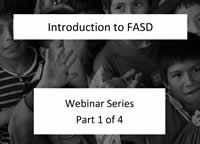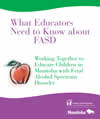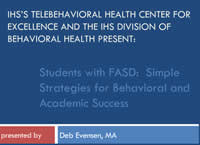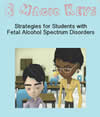Resources for Educators
In this section: Issues in the classroom | Strategies for educators
This section contains free manuals, videos, and webinars to help educators understand classroom symptoms of FASD, as well as proven strategies to help students achieve optimal academic outcomes.
Challenges in the classroom
 Common classroom symptoms of FASD
Common classroom symptoms of FASD
- Frequently described as having "low motivation," "not paying attention," or "daydreaming" (distractibility). Often perceived as lazy, defiant, or having low self-esteem.
- May be ultrasensitive to noise, light, texture (auditory, visual or tactile defensiveness), and over- or under-sensitive to pain. May ask questions that seem odd or out of context, seem picky, or avoid eye contact (gaze aversion).
- May require frequent re-teaching or seem to be starting from scratch (memory deficits). May be self-conscious about this and worried about being teased or perceived as "stupid" by peers.
- May master tasks one day, but unable to retrieve same skills a few days later (sporadic mastery): "I know I know it, but I just can't do it!" (memory deficits). Awareness of deficits may cause distresses.
- Unexpected schedule changes may disorient them (sequencing problems). Rearranging seating or decorations may precipitate anxiety and distress, increase loss of belongings and disorganization (strongly visually / kinesthetically cued).
- Discouraged, demotivated by incentives that work for many other children with same intelligence level (e.g., grades, sticker charts). Variability of performance is related to their central nervous system impairments (poor state regulation, overstimulation), rather than their level of desire to achieve: "I work just as hard on a 'D' test, as I do on the days I get an 'A,' so the grades don't help me."
- May have trouble changing activities, resist redirection (disregulation, state rigidity), show irritability, stubbornness, or repetitive speech or behavior (perseveration) as signs of distress.
- Though interested in a project, may not know how to start it (problems with initiation, prioritizing information).
- May have difficulty seeing patterns and trouble understanding cause and effect (information processing deficits). The obvious is not necessarily obvious to them!
- Require external prompts and cues longer than peers (memory deficits), despite efforts to be self-sufficient and show competence.
- Benefit from simple directives; use as few words as possible. Give instructions one at a time. May need some visual cues as prompts.
Written materials
 Fetal Alcohol Spectrum Disorders Education Strategies: Working with Students with a Fetal Alcohol Spectrum Disorder in the Education System (pdf, 244p.)
Fetal Alcohol Spectrum Disorders Education Strategies: Working with Students with a Fetal Alcohol Spectrum Disorder in the Education System (pdf, 244p.)
National Organization on FAS; Center for Disabilities, Sanford School of Medicine, University of South Dakota (2009)
Handbook for teachers with strategies for elementary, middle school, and high school students with FASD. (more  )
)
Making a Difference: Working with students who have Fetal Alcohol Spectrum Disorders (pdf, 122p.)
Yukon Education, Government of Yukon (2007)
Downloadable manual discussing 12 essential elements for serving students with FASD. (more  )
)
Teaching Students with Fetal Alcohol Syndrome/Effects: A Resource Guide for Teachers (pdf, 76p.)
Ministry of Education, British Columbia (1996)
Web-based guide describing the needs of students with FAS/FASD. The appendices provide helpful downloadable checklists that can be used in the classroom.
Webinars
 Understanding How FASD Impacts Students: Why is it Important? (45 min.)
Understanding How FASD Impacts Students: Why is it Important? (45 min.)
Hosted by the Fetal Alcohol & Drug Unit, University of Washington (2017)
Presented by Drs. Elizabeth West and Robin Harwick, this webinar explores the importance of education related to the impact of FASD on students. (more  )
)
Fetal Alcohol Spectrum Disorders for Educators (54 min.)
Hosted by the Indian Health Services (IHS) TeleBehavioral Health Center of Excellence (2017)
Julian Davies, MD, summarizes the neurobehavioral impacts of prenatal alcohol exposure and helps educators determine appropriate levels of involvement with referrals and collaboration. (more  )
)
Videos
Common Strengths of Students (6 min.)
Dan Dubovsky, MSW, FASD specialist, discusses the benefits of utilizing a strengths-based approach for students with FASD.
Parents of Special Education Students: Building Positive Relationships (3 min.)
Frank Arella of Teachings in Education provides concrete strategies for building collaboration with parents to improve student outcomes.
A Shift in Approach (5 min.)
This video helps educators shift their thinking to better support students by hnderstanding FASD as a brain based disability. Produced by Provincial Outreach Program for Fetal Alcohol Spectrum Disorder (POPFASD)
Comparing ODD, ADHD, and FASD (5 min.)
Dan Dubovsky, MSW, FASD specialist, explains the similarities and differences of ODD, ADHD, and FASD as they pertain to students.
Students Like Me (Episodes 1-2) (4 min. each)
Produced with a grant from NIAAA, this video teaches educators how to recognize students with FASD and modify their class and teaching methods.
Strategies for educators
Strategies for Succes
- Provide visual and auditory material
- Use repetition!
- Provide consistency and structure
- Pre-teach when changes are needed and before transitions
- Break instructions and activities into smaller components
- Include written instructions or use pictures
- Use short, simple sentences
- Explicitly teach organization and task management skills (calendars, to-do lists, notetaking)
- Create opportunities for hands on learning
Written materials
What Educators Need to Know about FASD: Working together to educate children in Manitoba with Fetal Alcohol Spectrum Disorder (pdf, 86p.)
Healthy Child Manitoba, Government of Manitoba (2009)
Great resource for classroom teachers in any region serving students with FASD. (more  )
)
Learning Landscapes: Supporting Sensory and Processing Behaviors Associated with an FASD (pdf, 2p.)
Suzie Kuerschner, FASD Consultant and Trainer
This document provides educators with advice on how best to support students experiencing sensory or processing behaviors associated with an FASD, including challenges impacting the ability to focus, self-regulate, organize, and process information.
Webinars
 FASD Solutions: Education and Behavioral Strategies (60 min.)
FASD Solutions: Education and Behavioral Strategies (60 min.)
Hosted by the Indian Health Services (IHS) TeleBehavioral Health Center of Excellence (2017)
Presented by Deb Evensen, MA, this webinar helps viewers understand how to identify neurologically driven behaviors and implement interventions to help students succeed. (more  )
)
Students with FASD: Simple Strategies for Behavioral and Academic Success (60 min.)
Hosted by the Indian Health Services (IHS) TeleBehavioral Health Center of Excellence (2015)
Presented by Deb Evensen, MA, this webinar is focused on providing strategies to improve academic outcomes and behavioral success for students with FASD. (more  )
)
Children with Fetal Alcohol Spectrum Disorders: Why Can't We Find Them (60 min.)
Hosted by the Indian Health Services (IHS) TeleBehavioral Health Center of Excellence (2015)
This webinar by Larry Burd, PhD, describes a validated screening tool for identification of FASD and how it can be used in an academic setting. (more  )
)
Videos
Strategies for Improving Outcomes (13 min.)
Dan Dubovsky, MSW, FASD specialist, offers concrete strategies for educators to help them reduce their frustration with students and help them be successful.
Every Kid Needs a Champion (TED Talk) (8 min.)
Inspiring video for educators presented by a teacher with 40 years of experience. A good reminder of the important role educators play in the lives of their students.
Students like Me (Episodes 3-9) (4-5 min each)
Gives educators a clear understanding of what FASD is, how it affects learning and behavior, and what can be done to help children with FASD learn.
Other Resources
Supporting Students with Fetal Alcohol Spectrum Disorders (Multimedia)
Engaging All Learners, Edmonton Regional Learning Consortium (ERLC)
This resource was developed by Dr. Jacqueline Pei and her colleagues for Professional Learning Communities, coaches, and educators. It includes three modules: how prenatal alcohol exposure’s effects the brain, strategies for educators supporting students, and how prenatal alcohol impacts behavior (e.g., mood, emotions, reactions).
 8 Magic Keys: Strategies for Students with FASD
8 Magic Keys: Strategies for Students with FASD
National Organization on Fetal Alcohol Syndrome (NOFAS); Created by Deb Evensen and Jan Lutke (2005)
Purchasable DVD ($20) of an animated film that uses a character named Mario to teach viewers about key strategies proven to help students with brain-based disorders become more successful in school and life. Download a PDF of the 8 Magic Keys. (more  )
)
Zarrow Center for Learning Enrichment
The Zarrow Center for Learning Enrichment provides many useful tools for transition planning to facilitate "successful secondary and postsecondary educational, vocational and personal outcomes for students and adults with disabilities."
Effective Practices and Predictors
National Technical Assistance Center on Transition (NTACT)
Find a number of practice descriptions and lesson plan starters for practices and predictors identified as effective for all students with disabilities. (more  )
)
